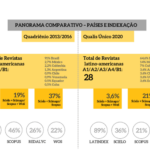By Cameron Neylon

Image: delfi de la Rua.
What are journals for? And what do they really do? In one view they are a brand, a masthead that stands as a widely recognized proxy for some notion of quality assurance or interest. In this view there is a natural and absolute hierarchy. The more “important” the higher the “quality”, the better the journal. An alternate view is that they are communities, even “clubs” as we have explored in one article. Here the question is different, how well does a specific journal serve a specific community. There is no absolute scale that can tell us which journal is “best” only the contextual question of how well a journal serves its community.
There are journals that pursue each of these paths, and many that try – usually badly – to do both. Those journals most successful at the “masthead” strategy are seen globally as names to conjure with, the gold-plating that a CV requires for success, and a signal of “international” credibility. In many places such “international” publications are prioritized and valued above work of merely “national” or “local” relevance. The issues this raises have been well discussed, see for instance the work of the Open and Collaborative Science in Development Network.
It was the genius of Robert Maxwell in the post second world war expansion of scientific production to couple community formation, around a new journal, with the prestige that could be created by the right editor, and in turn would accrue to that editor in exchange for their work. Maxwell’s financial model, which made scholarly publishing a revenue generator for the first time involved an ever-increasing set of disciplines that would need more and more journals, requiring more and more subscriptions to support them.
The idea that publishing in a general journal is the highest form of scholarly prestige is a more recent occurrence and is actually quite opposed to Maxwell’s intentions. However, it was a necessary solution to the serious coordination problem that arose from proliferation of journals and disciplines. As we create more journals, more disciplines and more siloes, it becomes harder and harder to communicate between them.
However, this solution comes with its own problem. The substantive knowledge within a community of the use-value of a particular contribution is replaced with proxies of prestige “I have no idea of the importance of this piece of work in that field, but it was published in Nature so it must be really good”. Such journals are so selective, with perhaps 90-95% of submitted articles being rejected, that they create the perfect conditions for driving instrumental behavior as we and others have observed. They drive the “performance of excellence rather than excellent performance”.
This is particularly problematic for nations, regions and communities seeking to develop and validate their own research capacity. The arrogation of “excellence” to the North Atlantic centres of traditional prestige and the creation of proxies that reflect and reinforce those behaviours leaves little in the way of guidance on true quality assurance for developing and transitional countries building their own post-colonial capacities. Indeed, it can be argued that these concepts represent a neo-colonial process imposing new and inappropriate forms of quality assurance, with the implicit goal of creating a new cycle of dependency (usually referred to “creating new markets for services”) on systems built for and within the North Atlantic region.
The challenge of capacity building in developing and transitional countries is a real one. A significant part of the colonial legacy was the weakening and destruction of local knowledge, communication and governance systems. Building and strengthening local institutions of research and knowledge production that provide the capacity to appropriate and exploit knowledge produced in traditional North Atlantic centres of scholarship is a sensible policy goal. Building and strengthening a profile within the constraints of North Atlantic concepts of “excellence” can also be a sensible tactical or strategic action in the context of building that capacity. Appropriating and exploiting the affordances of “journals” may be a significant part of these approaches.
A further challenge is in identifying which parts of the appropriated system are of local value, which will further structural bias, and how these are connected. The distinction Connell1 makes between “western” and “imperial” knowledge may be of value here, provided we recognize the way in which the tools and approaches which may be of value in general (the “western”), are tightly coupled to systems and processes which sustain the power imbalances that underpin the “imperial”. Aspects of good practice articulated within agendas such as that for “open scholarship” include reproducibility, transparency and effective communications. These may seem like general goods but their implementation is also often tied to systems and structures that require access to significant – and costly – technical infrastructures such as computational capacity and telecommunications networks.
This is at its most obvious in the contacts between western knowledge systems and indigenous and traditional knowledge systems. There is increasing interest in the value of indigenous and traditional knowledge in addressing global – not to say imperial – problems of health, food security, and climate change mitigation. Even where these efforts seek to engage in a respectful way that preserves the cultural context of indigenous knowledge, these encounters create substantial risks in weakening the social boundaries that define that context. Translation from a local, and perhaps threatened, language to English may undermine the use of that language. Appropriation of traditional knowledge into scientific systems involves the loss of context as well as of exclusivity. And all of this occurs in the context of structural and historic imbalances of power.
Sabato and Botana’s 1968 paper2 on the role of the local research system in national development both offers a framework, and a neat illustration of the problem. The working paper2, in Spanish, has never been translated into English and the model it describes, the Sabato Triangle, is little known outside of Latin America. The article, is most easily seen perhaps as a precursor of the triple-helix model of societal innovation. It details the way in which the research, government and industrial systems in a country need to combine. Drawing from the expansion of the triple-helix to the quadruple helix model we might today also add an important, but separate role of civil society.
However, this “translation” of the triangle into modern systems is limited. Sabato and Botana also offer an incisive commentary on how these interactions need to operate to support development. In particular they propose that it is not the strength or intensity of each vertex of the triangle that defines the support of development, but that the sides of the triangle are balanced. Further, they note that where one vertex has stronger interactions with an external node, such as the equivalent vertices for the “international” system that the contribution to development is weakened. That is, that it is local interactions that need to be privileged to support development.
This brings us back to the journals, with the divide between the view that journal “quality” is an objective question, or whether we need to assess the value of a journal in its context, for particular purposes. Our systems of research evaluation systematically privilege what is seen as “international” – which is really code for “North Atlantic” – and conflates the question of the breadth of interest, prestige and quality. Such journals may attract citations from global sources, but they distribute them preferentially to North Atlantic articles. They claim to deal with topics of global interest, but in fact deal preferentially with those that are North Atlantic. Indeed, the use of the term “international” might be seen as a rhetorical sleight of hand to avoid the obvious objection that their interests are not in fact global.
This equation of “international” with a narrow geographic area is a natural consequence of structural power and historical contingency. It is further reinforced by the interaction between network effects and the capacity for infrastructure investment. Metcalfe’s law – that the value of a network rises exponentially with the number of connections – indicates that the return to (expropriated) capital will reinforce existing asymmetries. Therefore, it is not enough to support an equality between local and global concerns. To achieve a balanced system requires that the local be actively supported and privileged. Again, this is the exact opposite of how our research evaluation systems operate.
This observation of the rhetorical conflation of “international” for North Atlantic offers one way forward. That which is truly of general value for humanity in western knowledge traditions (i.e. that which is “western” but not “imperial”) should be of global value or interest. Where “international” can be comfortably replaced with the word “global” this is a signal that something is of value. Where this replacement is uncomfortable or inappropriate it is perhaps a signal or that the issues at stake are parochial to the North Atlantic and therefore peripheral concerns for the global community.
Simply banishing the word “international” from our language – or at least that discourse held in English – may be a valuable way forward. But beyond this we need to consider how to institutionalise locality in our systems. Or rather, local communities need to consider how best to achieve this. We have argued elsewhere that the ideal of a journal is a club. That is that amongst the things that a journal should provide is identity, defining a community of practice as well as providing the platform for new members to learn their way into that community.
What this really means is that the role of the journal, particularly in the context of development should be to support the privileging of local interactions and content. That its most important role is building community. That in this sense it is precisely those journals that claim to be “international” that are of the least value where it really matters.
This post was originally developed and presented as part of a panel on “The political and social impact of journals and the research they communicate” at the SciELO 20 Years Conference.
Notes
1. CONNEL, R. Decolonising the Curriculum [online]. Raewyn Connell, 2016 [viewed 3 September 2018]. Available from: http://www.raewynconnell.net/2016/10/decolonising-curriculum.html?m=1
2. SÁBATO, J. BOTANA, N. La ciencia y la tecnología en el desarrollo futuro de América Latina. Políticas CTI. 2012 [viewed 3 September 2018]. Available from: http://docs.politicascti.net/documents/Teoricos/Sabato_Botana.pdf
References
BURANYI, S. Is the staggeringly profitable business of scientific publishing bad for science? [online]. The Guardian. 2017 [viewed 3 September 2018]. Available from: https://www.theguardian.com/science/2017/jun/27/profitable-business-scientific-publishing-bad-for- science
CONNEL, R. Decolonising the Curriculum [online]. Raewyn Connell, 2016 [viewed 3 September 2018]. Available from: http://www.raewynconnell.net/2016/10/decolonising-curriculum.html?m=1
FYFE, A., et al. Untangling Academic Publishing: A history of the relationship between commercial interests, academic prestige and the circulation of research [online]. Zenodo. 2017 [viewed 3 September 2018]. DOI: 10.5281/zenodo.546100. Available from: https://zenodo.org/record/546100
MOORE, S., et al. “Excellence R Us”: university research and the fetishisation of excellence. Palgrave Communications [online]. 2017, vol. 3, 16105 [viewed 3 September 2018]. DOI: 10.1057/palcomms.2016.105. Available from: https://www.nature.com/articles/palcomms2016105
POTTS, J., et al. A journal is a club: a new economic model for scholarly publishing. Prometheus [online]. 2017, vol. 35, no. 1, pp. 75-92 [viewed 3 September 2018]. DOI: 10.1080/08109028.2017.1386949. Available from: https://www.tandfonline.com/doi/full/10.1080/08109028.2017.1386949
SÁBATO, J. BOTANA, N. La ciencia y la tecnología en el desarrollo futuro de América Latina. Políticas CTI. 2012 [viewed 3 September 2018]. Available from: http://docs.politicascti.net/documents/Teoricos/Sabato_Botana.pdf
STILGOE, J. Against Excellence [online]. The Guardian. 2014 [viewed 3 September 2018]. Available from: https://www.theguardian.com/science/political-science/2014/dec/19/against-excellence
External links
Metcalfe’s Law <https://en.wikipedia.org/wiki/Metcalfe’s_law>
Open and Collaborative Science in Development Network (OCSDNET) <https://ocsdnet.org/>
Sabato triangle <https://en.wikipedia.org/wiki/Sabato_triangle>
About Cameron Neylon
Cameron Neylon is Professor of Research Communication at the Centre for Culture and Technology at Curtin University, Director of KU Research, and an advocate of open research practice who has worked in research and support areas including chemistry, advocacy, policy, technology, publishing, political economy and cultural studies. He was a contributor to the Panton Principles for Open Data, the Principles for Open Scholarly Infrastructure, the altmetrics manifesto, a founding board member of FORCE11 and served on the boards and advisory boards of organisations including Impact Story, Crossref, altmetric.com, the LSE Impact Blog and various editorial boards. His previous positions include Advocacy Director at PLOS, Senior Scientist (Biological Sciences) at the STFC and tenured faculty at the University of Southampton. Along his earlier work in structural biology and biophysics his research and writing focuses on the culture of researchers, the political economy of research institutions and how these interact, and collide with, the changing technology environment.
Como citar este post [ISO 690/2010]:
















Recent Comments